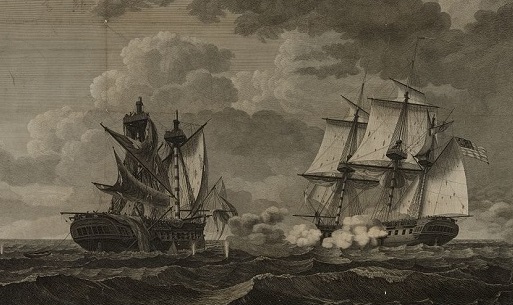After capturing the British frigate Macedonian in a brutal engagement, Stephen Decatur and his crew came home to a hero’s welcome, sharing $300,000 in prize money. Though strategically insignificant, the loss of the Macedonian was a major blow to the Royal Navy’s prestige and aura of invincibility.
"Grapeshot ... were pouring through our portholes like leaden hail; the large shot came against the ship’s side ... and passing through her timbers and scattering terrific splinters, which did a more appalling work than even their death giving blows" A British sailor describing the engagement between the United States and Macedonian.

Painted by T. Birch; engraved by B. Tanner, Library of Congress
After the victory of the USS Constitution victory over HMS Guerriere, President Madison and his advisors decided to unleash their modest navy. The small fleet sailed in search of British ships across the Atlantic in the autumn of 1812. The sailors’ exploits would change the way the Americans viewed their own navy as well as the British naval forces. One squadron commander was thirty-three-year-old Stephen Decatur, whose unwieldy but powerfully armed frigate United States would serve as his flagship. A hero from the Barbary Wars, Decatur was no stranger to the vessel he commanded. As a teenager Decatur worked on its construction at the Philadelphia shipyard, and he served on board as a midshipman during the Quasi-War with France. By October, 1812, the United States was cruising west of the Canary Islands. There it encountered the British frigate, HMS Macedonian, a faster but less heavily-armed vessel. Decatur and his crew skillfully outmaneuvered their adversary, staying at a distance to take advantage of their own longer-range guns. In the ensuing battle, the United States fired seventy broadsides at its opponent, an astonishing number. By the time the Macedonian maneuvered close enough to engage the United States, the British ship had lost most of her masts and rigging, and much of her crew, leaving the commanding officer little choice but to surrender. “With splinters, cannon balls, grape and canister poured incessantly upon us,” one British sailor recalled, “the reader may be assured that the work of death went on in a manner which must have been satisfactory to the King of Terrors himself.” When Decatur later boarded the crippled vessel, he found “fragments of the dead scattered in every direction, the decks slippery with blood, [and] one continuous agonizing yell of the unhappy wounded.” After patching up the Macedonian, a prize crew sailed the British ship back to the harbor in Newport, Rhode Island. Decatur and his crew received a hero’s welcome up and down the eastern seaboard. Though the single-ship engagement had little strategic significance, it profoundly affected public opinion on both sides of the Atlantic. For the Americans, the victory triggered feelings of confidence and delight; for England, feelings of disappointment, sorrow, and humiliation. Indeed, one shocked London newspaper would bitterly remark that, “anyone who had predicted such a result of an American war, this time last year, would have been treated as a madman or traitor.” Americans’ perceptions of their own competence at sea were beginning to change.
Last updated: March 6, 2015
